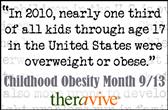September 20, 2013
by Christie Hunter

September is Childhood Obesity Month, and we're going straight after it. It's time to stop the excuses and tackle this epidemic head on. If you have a young child who is overweight, lets work together and change course. We will help you.
[More]
August 28, 2013
by Cindy Marie Hosszu

Back to School Series:
There goes your child…. And most of your heart
We notice it on that first day of kindergarten, or the first time our kids ride their bike out of our sight, or want to walk to a friend’s house. That sense of pride, and joy mixed with a crushing sense of fear and loss, as we watch our children grow, and experience the normal independence that will eventually bring them to adulthood. Often times, we think of our fears when we consider our reaction to our children growing up. The world can be a scary place to entrust our children. According to a GALLUP poll, 33% of U.S. parents with children in kindergarten through 12th grade fear for their child’s safety, and 52% think it is likely that a school shooting could occur in their area. [1]
The Loss Side of Letting Go
However, we don’t often acknowledge the loss we feel as part of letting go of our kids. We start to feel the loss side of letting go as our children head into adolescence. As our kids display a desire to separate from us, and we see them becoming more alien to us, we start to admit to ourselves that we are losing them. Understanding what is taking place in our kids can help us to let go more effectively, and help our kids through the transition from child to adult.
The Teen
First we should define this period when we start to feel that we are losing our kids. Every child is different, but most develop and experience a variation of the same stages during adolescence. Adolescence is approximately ages 11 – 21, and is commonly recognized as 3 stages in development.[2]
Early adolescence, ages 11-13, begins the period when a child struggles with their sense of identity. They may feel awkward, moody, and revert to childish behaviors. They are realizing that the parents they have idolized are only human, and conflict tends to arise. This is the time when they will test the limits of parent rules. This is a time when their thinking becomes more abstract, and the interests become more about moral things. They feel peer pressure, have a greater need for their privacy, and want more independence.
With the shift from their childhood identity to adolescence, parents may feel a loss of companionship. Their little boy or girl is no longer little, and has a new way of looking at themselves. Parents may feel the conflict creating stress in the home, and that their child is losing their respect.
Middle adolescence, ages 14-18, brings with it a greater sense of self. While the teen is still feeling the changes of identity, they are better able to reason, set goals, and begin to think of life in terms of their purpose and the larger picture, and they become passionate about their beliefs. They will distance themselves from parents, while integrating friendships into their lives in a deeper capacity. They may fall in love. This is a time when they will fight for causes, and justice.
It is during middle adolescence that parents will feel a loss of communication. The new freedoms that come with age can make parents aware that they cannot protect their child from the dangers of the world. Driving, dating, obtaining employment, or the thought of heading off to college are reminders that the child is becoming an adult. The dynamics of the relationship are changing, and the parent may feel stuck between the responsibility to protect their child from the child’s lack of life experience, and the realization that they must let their child make mistakes on their own.
Late adolescence, age 19-21, is the final stage of adolescence. This is the period when the young men and women become emotionally more stable, have developed a sense of identity, and a concern for their future, and others. They can think situations through, and are no longer run by instant gratification. They can examine their internal processes, and can be self-reliant, and aware. While peers are still important to them, they see the value in the family traditions and develop more serious relationships.
In this final stage of adolescence, parents experience the “empty nest.” As young adults head off to college, or move into their own environments, parents may feel as deep sense of loss. They feel the sense of responsibility has transferred from them to their child. They may feel depressed or obsolete.
It is Physical
It is not that our kids hate us, or that we are ruining them. Changes in the brain through adolescence are incredibly vast. Aside from the capacity for intellectual power greater than any other time in a human’s life, they are experiencing changes in hormonal chemicals that interfere with stress, as well as behavior. Their circuitry for emotional response is changing, and research as also shown that inadequate sleep can be responsible for many of the behavioral, and emotional attributes of adolescents.[3] Understanding that these changes are chemical gives us some power to cope with the emotions we see in kids.
There Is No Manual, But There is Help
Our kids don’t come with the proverbial owner’s manual, but we can gain knowledge from the experience and expertise of others. If at any point in your child’s life, you struggle with letting go, there is help available. You are not alone. Many people can benefit from counseling when navigating the delicate balance between keeping our children safe, and letting go enough for them to grow into the happy, healthy people they are becoming. Letting go is not always as easy to define as a set of circumstances for an age group. Sometimes the fear of letting our young children be independent can be overwhelming. A counselor can help navigate the journey. You can read more about therapy here.
[1] "Parents' Fear for Children's Safety at School Rises Slightly." Gallup.Com - Daily News, Polls, Public Opinion on Politics, Economy, Wellbeing, and World. N.p., 28 Dec.2012. Web. 4 Aug. 2013.
[2] Stages of Adolescent Development. (2008). Retrieved from http://www.ehsnrc.org/Publications/English%20Tip%20Sheets/TIP%20SHEET%2034_addendum.pdf
[3] NIMH · The Teen Brain: Still Under Construction. (2011). Retrieved from http://www.nimh.nih.gov/health/publications/the-teen-brain-still-under-construction/index.shtml
August 19, 2013
by Ashley Marie

Bullying is a concern for parents, teachers, and children. And this challenge is becoming evermore complex as traditional bullying behaviours are taking new forms on the Internet.
School will be in session again.
Mothers are scanning flyers from department stores to snatch the latest deal on school supplies. Fathers are planning their morning and afternoon pick-up and drop-off schedules. Girls are picking out their outfit for the first day of school. Boys are gearing up for soccer tryouts.
And bullies are cracking their knuckles.
Bullying is no small challenge, and its harmful effects span across North America.
As discussed in the news this past week, Rehtaeh Parsons, a high school student in Nova Scotia, attempted suicide and passed away this year after a series of incidents of cyber bullying. The perpetrators distributed multiple photos of her online and physically raped her.
In Canada, 1 in 3 students are bullied during the academic year.[1] Sadly, of 35 countries that were studied internationally, Canada had the 9th highest rate of bullying for students at the age of 13.
In the United States, bullying has increased over the last decade.[2] Researchers estimate that 1 in 5 students are bullied over the course of an academic year, and 8% of students report to have bullied others.
Bullying Defined
Bullying involves a perpetrator who intends to harm its victim(s) emotionally and/or physically.[3] Moreover, it includes repeated incidents of emotional and/or physical aggression and is characterized by a power imbalance between two or more individuals.
According to the Canadian Council on Learning, bullying can be broken down into four broad categories: (1) physical bullying, (2) relational bullying, (3) verbal bullying, and (4) electronic bullying.[4] The last of these is a recent phenomenon that is becoming evermore dominant.
Cyber Bullying
Cyber bullying involves online forms of aggression, such as forwarding private photos or information of the victim or writing malicious comments directed at the victim on social networking sites.
Typically, there are more female than male victims of cyber bullying.
In Canada, 73% of victims of cyber bullying reported receiving aggressive emails or instant messages.[5]
In the United States, 1 in 5 teenagers has been cyber bullied and approximately the same number of teenagers have been a cyber bully.[6] Studies show that there is frequently a relationship between online and in-person bullying. Cyber bullying tends to contribute to social exclusion for female victims and tends to result in physical bullying for male victims.
It Often Starts At Home
Researchers have found that the issues that trigger bullying often stem from family dynamics at home.[7] Parents who do not provide a caring environment can harmfully affect their children, who in turn express their discontentment at school. Once the pain of life at home reaches a breaking point, children are more likely to act aggressively towards others.
It Usually Happens at School
Though the triggers that produce bullying behaviour tend to begin at home, the act of bullying typically occurs at school. Studies show that bullying occurs most prominently during recess and in the classroom.[8] Children commonly find their social life at school, so incidents of bullying are more likely to occur on school grounds.
In addition, bullies commonly seek a wider audience to which they can display their power over another. This is especially the case when teachers or supervisors are not present. For instance, schoolyards often lack sufficient supervision, making it easier for bullies to act aggressively towards their victim(s) without any punishment.
How Parents Can Help a Victim of Bullying
Though children do not always tell an adult about incidents of bullying, those who do tend to turn to their parents for help. In fact, 1 in 3 children turn to their mother or father.[9] This is a great time to asses how life for your child is in general- how is their self esteem etc. A Family Counselor can help to assist in communication with your children and working through issues you may not feel confident tackling.
But for those parents whose children have remained silent, these are some warning signs to look out for: unexplained scratches or bruises, unexplained damaged belongings, fear of walking to school or home from school, unpredictable mood swings, anxiety, poor academic performance, and having few friends.
How Parents Can Help a Perpetrator of Bullying
Once an incident of bullying has been identified, the family of the perpetrator of bullying should be notified. Because bullies commonly grow up in dysfunctional families, researchers recommend that schools involve their parents in the process of preventing future incidents of bullying. When parents must commit to actively helping their child, the positive result can be more sustainable in the long run. There are lots of stresses for Parents with back-to-school coming, to get some perspective on this read more here.
Increasing Awareness About Cyber Bullying
In the digital age that we live in, it is also important to help children navigate online social interactions. Social media sites and online forums are often the arena in which modern forms of bullying take place. Parents and teachers can educate children about proper online etiquette and inappropriate behavior. If the triggers of bullying behavior are stopped at home and in the classroom, then we can help decrease incidents of bullying overall.
[1] Canadian Bullying Statistics. 2012. Canadian Institutes of Health Research. [online] Available at: <http://www.cihr-irsc.gc.ca/e/45838.html>
[2] Bullying and Adolescent Health. 2011. Office of Adolescent Health. [online] Available at: <http://www.hhs.gov/ash/oah/news/e-updates/eupdate-7.html>
[3] Bullying in Canada. 2008. Canadian Council on Learning. [online] Available at: <http://www.ccl-cca.ca/pdfs/LessonsInLearning/Mar-20-08-Bullying-in-Canad.pdf>
[4] Ibid.
[5] Canadian Bullying Statistics. 2012. Canadian Institutes of Health Research. [online] Available at: <http://www.cihr-irsc.gc.ca/e/45838.html>
[6] Bullying and Adolescent Health. 2011. Office of Adolescent Health. [online] Available at: <http://www.hhs.gov/ash/oah/news/e-updates/eupdate-7.html>
[7] Rigby, K. 2007. Bullying in Schools and What to Do About It. Victoria, Australia: Acer Press.
[8] Ibid.
[9] Ibid.
August 17, 2013
by Ashley Marie

Students, parents, and professors are gearing up for the start of another academic year. And so should you.
Therapists should pay special attention to the emotional and psychological stresses of academic life.
Recent studies suggest that approximately half of American students experience depression.[1]Tragically, some become so depressed to the point of committing suicide, which is the second main cause of death for college and university students.
In 2011, half of students at the University of Alberta claimed to have felt hopeless during the academic year. Seven percent of these Canadian students had considered committing suicide.[2]
At the University of California Berkley, a survey showed that, in a typical academic year, almost half of their graduate students faced a mental health issue.[3] Moreover, about one in four students were not familiar with mental health support services provided by their university.
The Millennial Generation
To analyze some of the mental health issues present on college campuses, it is first beneficial to understand this generation of students.
They are part of the Millennial Generation, which includes individuals born between the 1980s and early 2000s.
As pointed out by Howe and Strauss, the Millennial Generation is characterized by high levels of education, ethnic diversity, an ambition to achieve, and an awareness of social and community issues.[4]
While the above characteristics are positive, this generation has a difficult time accepting criticism and setbacks.
Millennial students have been consistently praised for their successes throughout their lives – by family members, teachers, athletic coaches, extracurricular leaders, music teachers, etc. They have been told that they are embedded with talent and potential. In their eyes, the world is their oyster.
Being a Millennial myself, I recall the numerous awards, honours, and distinctions that were poured upon my siblings, friends, and I during our grade-school years. It seemed that everything we did was seen as a cause for celebration. Our identities became wrapped up in award ceremonies, notices of distinction in our local newspaper, scholarships, and words of praise.
Transitioning from High School to University
This emotional support served as a double-edged sword once I first stepped onto my university campus. Suddenly, my cheerleaders and their blue and white pom-poms had vanished into thin air.
There I was – all alone in a large university dorm miles away from home.
I do not blame anyone for the challenges of my first academic year. However, I cannot deny that they were present. Broadly speaking, I struggled to balance two main areas: (1) the academic demands and (2) my social life.
Academic Demands
I was grateful to have received academic awards that helped finance my tuition fees. However, this blessing soon became a curse. To maintain my awards, I was required to maintain straight A’s throughout my four years of study, as well as become involved in extracurricular activities.
This pressure pushed me to work hard and to learn a wealth of knowledge from brilliant professors. I also became active in a fascinating array of extracurricular activities.
However, I eventually pushed myself to the point of feeling physically and emotionally unwell. My symptoms included stress, nausea, dizziness, depression, and a loss of appetite. But having been told that I was born to succeed, I ignored these symptoms and forced myself to work harder.
Social Life
Though this is not the case for all students, I largely ignored social pressures to party hard. Nevertheless, I slowly learned that I needed to expand my social life in order to be a successful student.
In my third year of study, I began to shift some of the time that I spent overworking to spend more time with friends. Surprisingly, my grades went up that year, as well as my level of happiness. For the first time since high school, I felt less stressed and more fulfilled.
A Healthy Balance
All the advice I had received from student support services, as well as my university therapist, revolved around creating an ideal study schedule. The focus was on managing my time efficiently, so that I could accomplish my academic goals.
However, the key to my success was increasing my level of happiness, not my level of organization. I already had a perfectly organized schedule – trust me, it was even colour-coded and divided up into different categories. The solution for me was to brighten up my social life.
I am only one example of a Millennial student, and therapists should recognize that they cover a wide spectrum.
But I wish my therapist had turned to me and said, “Darling, you don’t need to be the next Hillary Clinton. Why don’t you avoid the library this Friday night and go out with your friends?”
[1] Facts About Depression. SMH Screening for Mental Health. [online] Available at: <http://www.mentalhealthscreening.org/info-and-facts/depression.aspx>
[2] What’s behind the rising rates of depression among Canada’s college students? Career Options. [online] Available at: <http://www.careeroptionsmagazine.com/4475/what%E2%80%99s-behind-the-rising-rates-of-depression-among-canada%E2%80%99s-college-students/>
[3] Facts About Depression. SMH Screening for Mental Health. [online] Available at: <http://www.mentalhealthscreening.org/info-and-facts/depression.aspx>
[4] Howe, N. and Strauss, W. 2000. Millennials Rising: The Next Great Generation. New York: Random House.
August 4, 2013
by Ashley Marie

Back to School Series
The start of your college career is just around the corner. You’ve done your campus tour, been assigned your college dorm, signed up for your classes, said goodbye to your high school friends, listened to your parents cry as they anticipate your departure, and wondered what your life will be like as a college student.
Will you get along with your roommate? Will your professors be incredibly intimidating? Will your course load be too heavy? Will you find any extracurricular activities that you enjoy? Will you make new friends? Will you be able to manage your finances? And will these be the best or the worst four years of your life?
Although this article is by no means comprehensive, it outlines some helpful tips that I’ve gathered during my years as an undergraduate and postgraduate student. These might help you make these the best – and not the worst – years of your life.
1. Get To Know Your Roommate
If you are living with a roommate, take the time to get to know him or her. After all, you will be spending the next eight months living right next to each other. After you’ve both settled in, consider going for a walk or grabbing a coffee with him or her just to get to know each other a bit.
Even if you are complete opposites, those first conversations are crucial to understanding how to make the most of your time living together. What are your schedules like? Is he or she an early riser or a night owl? How clean or messy is he or she?
Though these might seem like trivial questions, appreciating each other’s differences in lifestyle is essential to creating a healthy living situation. Having worked as a Residence Don for two years, I witnessed a strong contrast between roommates who knew how to respect each other’s boundaries and those who didn’t.
I would even suggest writing up a quick roommate contract with a short list of what you absolutely need your roommate to respect. A few examples include the need for a quiet study space at certain times during the week, a need to have the freedom to invite friends over on Friday nights, or the need to have a decently clean living space.
2. Do Not Be Shy
If you’re like me, meeting a whole new group of strangers can be intimidating. But getting yourself out there is worth it. College is not only an opportunity to improve your mind, but it is also a tremendous opportunity to improve your social life.
Like never before, you will have endless crowds of people to interact with – from a variety of cultures, backgrounds, belief systems, interests, and ideas.
During my years as an undergraduate and postgraduate student, I noticed a marked difference between high school and college. In high school, meeting new people was more difficult – there were fewer people to befriend and people were less likely to make new friends. However, in university the atmosphere was different. I made new friends left, right, and centre – at the library, in lectures, at school clubs, at formal events, at the school pub, in dorms, and the list continues.
3. Get Involved
One thing I will never regret about my university years was my choice to get involved in extracurricular activities. Not only is it a great way to meet new people, but it is also a fantastic way to develop a new skill or try something new.
Most colleges and universities have a variety of clubs and activities to choose from, and you can often find out more about them during your orientation week. Try a few in your first month, and if it’s not the right fit, there is bound to be something else that fits you like a glove.
Try a salsa class, write for your school newspaper, join an activist group, play a sport, or perform in a play. The options are endless.
4. Start Studying Early
Unfortunately, the attractions of dorm life, a fun social life, and engaging extracurricular activities can turn into an unhealthy distraction from your studies. Map out your assignment deadlines, midterms, and final exams as soon as you get your academic syllabi. Divide up the amount of work that you will need to do to perform well, and then ensure to create a weekly schedule that realistically balances your schoolwork and your other interests.
There is no need to pull an all-nighter the day before your final exam worth 50% of your final grade. Start early, and you will be a lot less stressed and learn a lot more.
5. Spend Wisely
University tuition is already expensive, so it is important to be realistic about your finances. While it is great to go out with your friends, make sure not to overdo it. There are usually a lot of discounts available for students, so find out what deals apply to you. Can you find your books at a second-hand store? Are drinks cheaper on Tuesday nights? Is membership at your university gym cheaper than a regular gym? Saving a bit here and there makes a huge difference in the long run.
6. Do Not Forget to Call Home
During my first year as an undergraduate, I miserably failed at calling home. But this was not a healthy choice – neither for me, nor for my parents. It is important to give updates on how you are doing, to remember that there are people who care for you, and to catch up with your loved ones. If your parents are helping you out financially, then remember to thank them every once in a while. If grandma sent you a box of baked cookies, then give her a call to let her know that you appreciate her. There are people who helped you get to where you are today, and they want to know that you remember them.
7. Do Not Be Afraid to Seek Help
Being away from home can be difficult. Researchers have found that the stress of a first failed midterm or a low grade on an assignment can lead to a vicious cycle of hopelessness, lack of motivation, and declining academic performance.[1] Universities often experience a peek in the number of students coming to seek help during final exam season. At McGill University, for instance, their mental health clinic serves four times the number of students close to the end of the academic year.[2]
If you are feeling stressed, lonely, discouraged, or anxious, do not be afraid to seek help. Your college has a variety of staff available to help you, including a team of mental health professionals. If you just need to talk to someone, there is always a listening ear available. Find out where your college’s counseling office is, and be encouraged that you are not the only one on campus who is finding your new life as a university student a bit of a challenge. Yes, you can make these the best years of your life.
[1] Hanlon, C. 2012. Addressing mental health issues on university campuses. State of Mind. [online] Available at: < http://www.aucc.ca/wp-content/uploads/2012/06/mental-health-state-of-mind-university-manager-article-summer-2012.pdf>
[2] Bradwhaw, J. and Wingrove, J. December 07, 2012. As student stress hits crisis levels, universities look to ease pressure. Globe and Mail. [online] Available at: < http://www.theglobeandmail.com/news/national/as-student-stress-hits-crisis-levels-universities-look-to-ease-pressure/article5902668/>
December 11, 2012
by Gloria Day

Well on the eve of Christmas I think it is timely that we deal with this chapter called “Boundaries and Your Family”
A few important things have stuck out for me in this section. Primarily, how we can make a change on the outside yet if the change is not in our hearts or in our minds or our values then it will only be actions and in fact, we will be easily swayed to the old way; as well as, possibly feel guilty for this internal inconsistency.
Specifically, this relates to how we have separated ourselves from our families. We may have chosen to move to a different town, gotten married, even had kids, yet we still feel a pull from the familial roots we have come from as we have not made a change to move away in our hearts. This moving away is a sign of maturity and growth.
Later in the chapter we read about how God asks us to really leave our families and to be adopted by Him.
Have you done that?
Do you identify with who you are as the daughter of “Sally” or as a ‘Daughter of the King’ ?
Where is your compass set to?
Towards your family of origin and the guilt, hurts, and abuse from the past OR towards Freedom and the future?
I was just discussing today how this Christmas will probably be full of stress and unmet expectations. A Godly friend questioned me with whom do I identify? With the sins of my family’s past and the guilt and codependency of my youth or with the freedom I can have in Christ ?AND where are my expectations…if on ANYONE but God I am sure to get disappointed this holiday season!
It seems like the rubber meets the road for me in this Chapter. I desire to be well rounded. To have my mind and heart focused on God’s goodness, yet I seem to get pulled back into needing affirmation and approval by people who actually cannot even fully affirm or approve me!
“Many times we are not obeying the Word of God because we have not spiritually left home.”(Pg 138)
Here are a few points on how to bring resolution to boundary problems in the family
<!--[if !supportLists]-->1)<!--[endif]-->Identify the Symptom
<!--[if !supportLists]-->2)<!--[endif]-->Identify the conflict
<!--[if !supportLists]-->3)<!--[endif]-->Identify the need that drives the conflict
<!--[if !supportLists]-->4)<!--[endif]-->Take in and receive the good
<!--[if !supportLists]-->5)<!--[endif]-->Practice boundary skills
<!--[if !supportLists]-->6)<!--[endif]-->Say no to the Bad
<!--[if !supportLists]-->7)<!--[endif]-->Forgive the Aggressor
<!--[if !supportLists]-->8)<!--[endif]-->Respond, Don’t React
<!--[if !supportLists]-->9)<!--[endif]-->Learn to love in freedom and responsibility , Not in guilt
Well, I desire as Christmas comes closer to apply these items and to hopefully have a love, peace, and boundary filled holiday!
Reference: Cloud, H., & Townsend, J. (1992) Boundaries: When to say Yes, When to say No; to take control of your life. Grand Rapids, Michigan: Zondervan.
August 4, 2011
by Christie Hunter

By Tanya Glover
Theravive.com Contributor
Once upon a time divorce was a very ugly and taboo word. Back in the 1950’s and 1960’s the word divorce was only whispered and a woman who was divorced was looked upon in a less then favorable light. You could sometimes overhear someone talking in hushed tones about the divorcee who just moved in next door and what type of person she must be. Now, however, we live in a completely different world where divorce is a common word. It is no longer frowned upon (depending on one’s culture or religion) and often filed for. We all know someone who has been through a divorce and it is apparent that it can be a painful process for both husband and wife. But, and unfortunately so, the people who suffer the most when a marriage ends are the children that the marriage produced. As consenting adults, we have the choice of terminating our marriages and moving on. We can kick and scream or laugh and celebrate but in the end, it is our children who are heartsick over the loss of their comfort zone of family. Divorce is a part of life. It is a personal choice and one that in some cases cannot be avoided. However, as the adults it is our responsibility to make sure that our children have the coping mechanisms and support they need to get through this tough time in their lives.
Mommy/Daddy, is it my Fault?
This is a question that is on the minds of the majority of children whose parents divorce. A child’s world is limited to a certain extent. Children, especially young children, have a limited ability to think outside the box. They are not aware of mommy’s temper problems or daddy’s extramarital affair. All that they know is that there is tension and in many cases loud arguments. Not being able to reach out their minds to larger problems they begin to search within themselves for answers. Typically the question they pose to themselves is “what did I do wrong?” Maybe they think that the fact that they got a bad grade or that they have been being naughty a little too often lately has caused daddy to move out of the house. Maybe they think “I have been so bad that Mommy does not want to take care of me anymore so she left.” This is the most common train of thought for a child whose family is breaking up. The fact that is it common does not make it any easier and it is the parents job to make sure that the child does not think that their marital problems have anything to do with them. Talking honestly (Not too honestly though. You do not want to tell little Johnny that you are divorcing because daddy likes his secretary too much.) to your child about divorce is the first step in helping them cope with the new and scary change in their lives. Try telling the child that sometimes when mommies and daddies cannot get along they have to live apart from each other. Let them know that the problem is with their relationship and not with the child and that they love them very much even if they do not love each other anymore. Make sure the child knows that the door is always open for conversation about the divorce and other changes that are coming their way and that both mommy and daddy will be there to help them.
Will I Still Get to See Mommy/Daddy?
With divorce come some heavy changes for the child. Maybe daddy is moving out or maybe the child is moving to a new home with mommy. No matter what the plans for living arrangements are it is important for the child to have a place to feel safe and loved. No matter what the reason for the divorce (short of one spouse being dangerous or abusive) the child should be assured that they will have access to each parent no matter what. It is understandable that a couple that is divorcing would rather not be in the same room together and often there is fighting (in or out of court) about child custody. Any of this should be taken care of out of hearing range of the child. There is enough stress on a small body without adding more to worry about. Ideally, the parents should muster up enough maturity to be able to come up with a custody plan that is in the best interest of the child even when the thought of revenge (using the child as emotional bullets) is so very tempting. With divorce comes anger and sometimes mommy and daddy will be available to them always and just because they do not all live together does not mean they are not a family anymore. If the child wants to see or talk to the absent parent, allow it even if it is not their day for visitation. A little compassion will go a long way in making the child feel that they have some control of the situation.
A Little Love Goes a Long Way
When a child experiences the effects of divorce there are feelings of confusion, stress, anger, and loss. When children feel these things a little love can go a long way. Saying I love you to your children freely and often. Make it easy for them to believe that things can be okay again. The child needs to know this from both parents. Not hearing it can lead to the faulty belief that things happened the way they did because of them. Love also includes allowing the child to love and miss the absent parent. Never speak badly about the other parent in front of the child. The aim here is to make the child comfortable and happy. Hearing negative things that have nothing to do with them only serves to make then confused and question the love of the other parent. It is fine for mom and dad to dislike each other. It is fine for mom and dad to trash each other to friends and other family members. It is not fine for the child to hear what a no good such and such their father or mother is. Once the child hears these types of things it can give them the feeling that they have to take sides in the divorce and this leads to more stress. If the child feels they have to choose sides they will spend time worrying about the parents side they did not choose and if that parent is now angry with them. None of this is the child’s place in the family relationship and they should never be put in such a position.
Coping Through Therapy
Sometimes, love and reassurance is simply not enough to help a child cope with divorce. When it is clear that the child needs more then the parent is able to give it is recommended that therapy be sought. Therapy can be very beneficial to a child who is coping with divorce. While a child’s parents should be their main safe place where they can talk about their feelings and emotion, when a divorce is occurring it can be hard for the child to open up to the parents. This is because the things they are feeling are about their parents and they do not always feel comfortable telling their parents how they feel about things pertaining directly to them. In cases like this, bringing in an unbiased third party can be highly beneficial. Though it may be uncomfortable and scary for the child at the beginning of the therapeutic relationship, after a few sessions the atmosphere becomes more easy going and comfortable and the child finds it easier to open up. The therapist plays the role of trusted confidant and once the child forms this trust with the counselor the healing process can begin. The problems that the child is facing and the emotions they are struggling with can come out into the open and the therapist, getting down to the child’s level, can teach the child how to cope with their feelings. Once the relationship is solidly established there is then the possibility of bringing in the parents, either together or one at a time, to participate in the child’s therapy. This can help the parents become more aware and understanding of the child’s feelings and how they can best help in the healing process. This can also help the child to learn to trust the parents again and feel less like they come from a broken family.
Family is Forever
Divorce is a painful reality in today’s society. Children are affected in different ways then the adults so they require special emotional care in order to gain coping skills and begin healing from the painful reality that has just hit them. Please remember to love your children outwardly and often. Remind them often that there are all different types of families and just because their parents are divorced does not mean that they are no longer a family or that they are loved any less then they were prior to the divorce. Life if forever changing but not all change is bad and this is the lesson that can be gained from this experience.
March 29, 2010
by Debra Bacon

By Debra Bacon
Theravive.com Contributor
Relationships, hormones and pressures
Teenage years are challenging for the teen and parents. Maintaining an open and communicative relationship with your teen is vital as they move through adolescence.
Hormonal changes, mood swings and peer pressure are a part of the growth process, however, it is important to be aware of subtle, and overt signs that trouble may be on the horizon.
While some unusual behavior is normal with teens, knowing your teen--how they generally react and interact with you--will help in identifying potential problems.
Red Flags
Following are signs to watch for that may indicate your teen is headed down the wrong path.
Isolation: During adolescence, a teenager typically distances themselves a bit more than before from family. Yet, if your teen is avoiding your advances toward conversation and interaction, there may be a problem. If they spend more time away from home or alone, locked in their room, a red flag should go up. This can be an indication of drug use or depression.
Sudden weight loss and/or appetite change: This behavior is indicative of peer and social pressures to look a certain way. An eating disorder, depression or drug use can be at the root of this conduct.
Extreme mood swings: Mood swings are a common thing with teens. Therefore, it is a bit more difficult to discern what is problematic and what is normal. However, knowing your teens normal reactions will assist you follow up accordingly. This behavior could be a sign of social problems; hanging out with the wrong crowd. Meet your teen’s friends and their parents. Know who they are spending their time with and what values their parents hold dear.
Declining grades or lack of interest in school/activities: Since teens have so much on their minds, at times, a lack of interest in school work could be chalked up as normal. However, if their grades are falling sharply, they are cutting classes and pulling out of activities once enjoyed, it is time to check-in. Get to know your teen’s teachers and find a way of communicating with them on a regular basis. Be involved in your adolescence education and school activities.
Motivation issues: If your once spunky teen suddenly begins to seem more tired, and uninterested in hobbies and former friends, they could have a problem with substance abuse. They could be depressed or feeling isolated and alone. Talk with them, let them know you care. Be available to listen, love and offer advice, if needed.
Get Involved
If your teen is showing signs of unusual behavior, it is the parents’ responsibility to get to the bottom of what is going on. A child wants to know you are concerned and interested, even if they do not act like it.
It may feel like to you that you are spying on them or invading their privacy when checking up on them. Press forward, as it could mean the difference between life and death.
March 22, 2010
by Debra Bacon

By Debra Bacon Theravive.com Contributor
Bullying: a new epidemic?
Bullying is becoming an epidemic in our schools, cyberspace, parks and other areas where kids hang out. Its affect on children can be lasting, even following them into adulthood. It is vital to deal with bullying swiftly and lovingly.
The times of a simple trip in the isle, just for the fun of it, between friends has passed. Today children are faced with far more intimidating tactics.
Often, kids are attacked while others look on, without going for, or helping the victim. Children are often afraid to say anything to anyone for fear of retaliation.
Know the signs
Identifying the signs of bullying is a key element in protecting your child, and keeping them safe.
Your child’s behavior will offer tell-tale signs bullying may be occurring. Following are a few things to watch for:
Lack of appetite
Decreased interest in school/social activities
Few, if any close friends
Trouble sleeping
Stomach aches and other ailments
Unexplained bruises, cuts or scrapes
Missing or damaged personal items
Anxiety
Isolation
How you can help
If you notice you child manifesting any, or a number of these behaviors, it is time to talk--reach out with a kind, loving arm. Get as many details as you can about the bullying incidents. They may be reluctant to speak to you about the situation at first. Often this is because of misplaced blame or shame.
It is important to reassure your child they are safe. Express how much you want to help them overcome this situation. They are likely not the only child being harassed by the bully.
Talk with school officials, such as the counselor, principal or other significant policy makers about the danger your child is facing.
Be persistent, and follow up. Ensure changes are made to eliminate the threat. Furthermore, depending on the type of abuse your child is being subject to, criminal charges may be in order.
Talk to your child about how to handle the bullying. Encourage them to remain calm when confronted. Tell them to be firm when they speak to the aggressor. Offer suggestions of what they may say, such as: “Stop what you are doing right now.” Stress the importance of walking away. Never encourage aggression, or similar bad behavior.
Encourage your child to make friends with people in his class. Children should walk in pairs or small non-threatening groups. Especially when going to the bathroom, lunch, playground and other potentially isolated areas.
General rule of thumb
Monitor your child’s activity. Such as, know who their friends are, and be involved as much as you can in their lives. Be careful of what you allow your children to watch on television and videos. Behavior breeds behavior, and violence can lead to violence.
Computers are a way of life these days. As such, the newest form of bullying or threat can come from the internet. As much, if not more, as you would monitor what your children read and watch, the same should apply to the internet. Cyber bullying has lead to mental breakdowns, violent acts, sexual assaults, murder and suicide. Any type of bullying has this potential. If suppressed, an individual can move through life harboring a lot of resentment, guilt and shame.
Knowing when to intervene and get professional help is paramount. It can eliminate or assist in treating more complicated mental conditions, such as anxiety disorders, resulting from bullying.
September 7, 2009
by Donald Olund

By Don Olund, MA, LCPC, NCC
View Don's Profile
Raising a responsible teenager is a parent’s dream. Living with an irresponsible teenager is a parent’s nightmare! The task of raising teens today is challenging for some and frightening for others. Cyber-culture teens are exposed to multiple streams of information that shape identity and influence behavior. Face Book and My Space are among many portals of escape teens will use to connect with peers and disconnect from family. Worried parents often wonder, “Am I losing connection with my teen?”
To answer that question, let’s begin by looking at what’s going on during adolescence. It boils down to one word, “change”. Teens undergo significant and rapid change during puberty. Physical and hormonal change seem to happen overnight. In addition to the physical transformation is the emergence of a sexual identity.
So, not only is the teen body in a state of flux, the identity is too! Erick Erickson called this stage of development, “identity vs. inferiority”. Throughout adolescence teens try on different “identity hats” to see what fits. Watch this process unfold by observing teens experiment with different clothes styles, hair styles, music tastes, peer groups, etc… Independence is their mantra. Don’t be too alarmed when your teen questions your rules or challenges your authority. You may even notice changes in your relationship with your teen. It may feel like they are pulling away from you. Actually, this is a normal process in identity formation.
Finally, another unsettling change you may notice in your teen is a shift from family dependence to peer dependence. Suddenly, they want to spend all their time with their friends. At home you may find them on their cell phones or text messaging the friends they just left minutes ago! When you tell them to get off the phone they head for the computer where they can email, meet in chat rooms, or instant message.
Now, let’s examine the warning signs that indicate your teen may be pulling away too much. One of the first signs is a pattern of isolation when they are at home. If your teen spends an inordinate amount of time playing video games, watching TV, talking on the phone, or bunkered down in their bedroom, with very little interaction with family members, it signals a disconnect. Another sign of pulling away is a preoccupation with friends. If all their free time is spent hanging out with friends, talking on the phone, text messaging, etc… and minimal interest in spending time with the family it’s a sign they are drifting.
A third sign is often detected in the tone of their interaction with family members. It can be summed up in one word: respect. Parental influence can be measured by how their teenager talks to them and responds to their requests. If your teen reacts by yelling, swearing, or defiant behavior, it is an indicator of disrespect. When respect disintegrates, the parent-teen relationship suffers. By the way, teens have no respect for parents who lose control. Your best bet is to know your buttons and disarm them. Here’s a couple of tips on showing teens respect. Respect their right to speak. You don’t have to agree with them, but listen and try to understand. Respect their need for space. This may sound like a contradiction to what was said earlier about isolation. The point is teens need to have their own space and a little time where they can be by themselves.
A fourth sign to watch out for is the emergence of academic and/or behavioral problems. Teens who pull away tend to show their opposition to their parents by doing poorly in school or by defying household rules. Finally, if you notice a pattern of risk-taking behavior such as drug and/or alcohol use, staying out all night, or other signs of poor impulse control, you have a problem on your hands. If a teen is out-of-control, it is important for parents to take control of the situation. Teens with behavioral problems need intervention. This is a time for parents to step in and do whatever is necessary to get them back on track. Intervention may require the assistance of mental health professionals who are experts in helping families. Wise parents take advantage of the support counseling services provide.
At LifeWork Counseling, we understand the complexities of parent-teen relationships. Our goal is to help families make and keep the connections they cherish. In family therapy, parents and teens learn how to stop conflict cycles and discover more effective ways of communicating where mutual respect is honored. Parents learn how to disengage from power struggles. Teens learn how to manage their behavior and get back on track academically. Individual counseling can address specific adolescent problems such as impulse control, social interaction, and management of mood and anxiety-based disorders. Marriage counseling is available for couples in conflict over parenting styles, or needing assistance in balancing the needs of marriage and parenting. Are you losing connection with your teen or your spouse because of family difficulty? Don’t let them drift too far away before you take action. Contact LifeWork Counseling. We find solutions that work! Email me: don@lifeworkcounseling.net.